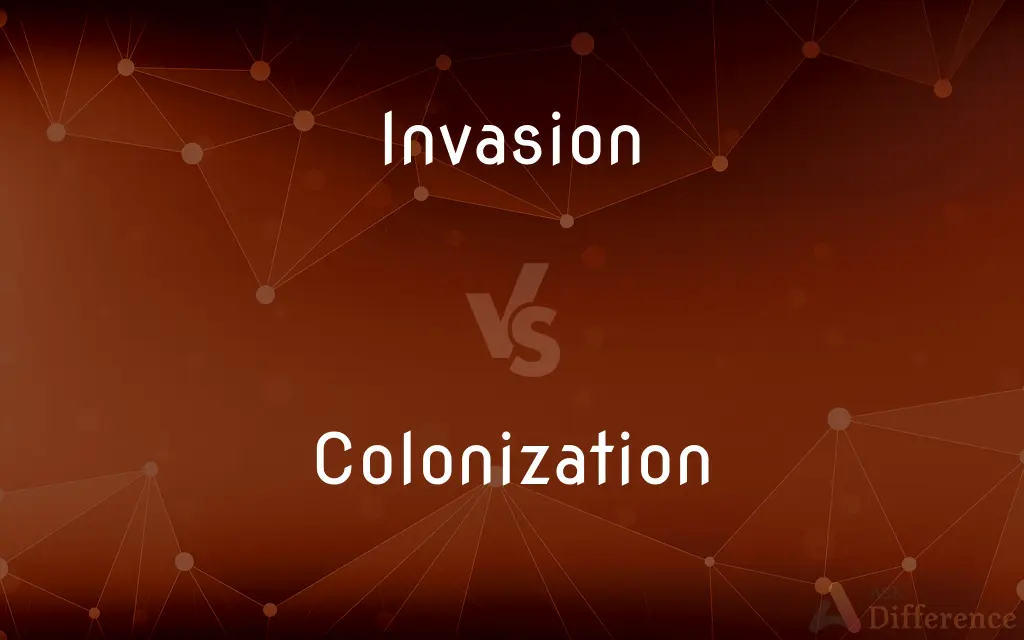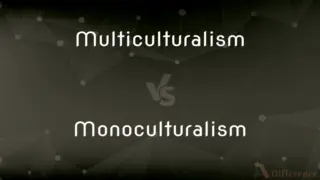Invasion vs. Colonization — What's the Difference?
Edited by Tayyaba Rehman — By Fiza Rafique — Updated on March 29, 2024
Invasion is a forceful entry into a territory, often for control, while colonization involves settling and establishing governance over a new area.

Difference Between Invasion and Colonization
Table of Contents
ADVERTISEMENT
Key Differences
Invasion typically involves a military action where one nation or group forcefully enters another's territory, often leading to conflict and occupation. This act is usually motivated by the desire to gain control over the land, resources, or to assert dominance. On the other hand, colonization refers to the process of settling among and establishing control over the indigenous people of an area. The motive behind colonization often includes economic exploitation, expansion of territory, and spreading of culture and religion.
Invasions are generally swift and are aimed at conquering or subduing an area through force. They are characterized by acts of aggression and military strategies to overpower the opponent. Whereas, colonization is a longer-term process that involves not just the takeover but also the establishment of a new governance system, infrastructure, and cultural assimilation or suppression of the local population.
The impact of an invasion is often immediate, leading to significant changes in power dynamics, disruption of local governance, and in many cases, casualties and destruction. While colonization, on the other hand, exerts its effects over a longer period, fundamentally altering the social, economic, and cultural fabric of the colonized area through systematic policies and practices.
Invasion is seen more as an act of war or aggression, invoking international laws and responses related to sovereignty and territorial integrity. In contrast, colonization, especially in historical contexts, was frequently backed by nationalistic and imperialistic ideologies, often justified under the guise of bringing civilization or development to the colonized territories.
In terms of resistance, invaded territories often respond with immediate military defense or guerrilla tactics to repel the invaders. Conversely, resistance to colonization may evolve over time, including both armed uprisings and intellectual movements aimed at gaining independence and restoring indigenous governance and cultural practices.
ADVERTISEMENT
Comparison Chart
Definition
Forceful entry into a territory by a group or nation, often involving conflict.
Settling among and establishing control over the indigenous people of an area.
Motivation
Control over land, resources, or strategic advantages; assertion of dominance.
Economic exploitation, territory expansion, cultural and religious spread.
Duration
Short-term, focused on immediate conquest and control.
Long-term, involves establishing governance and assimilating or suppressing local culture.
Impact
Immediate changes in power dynamics, casualties, and possibly destruction.
Gradual but fundamental alterations in social, economic, and cultural aspects.
Response
Military defense or guerrilla tactics by the local population.
Armed uprisings, intellectual movements, and long-term resistance strategies.
Compare with Definitions
Invasion
The act of entering a place in large numbers, especially by an enemy.
The forest was under invasion by beetles.
Colonization
The establishment of a colony by a country in another land.
The era of European colonization reshaped many societies.
Invasion
A military offensive where forces enter a territory to conquer it.
The invasion led to the rapid occupation of the city.
Colonization
Settling among and exerting control over the indigenous population.
The colonization process involved both negotiation and force.
Invasion
Sudden entry into someone else's property or space.
The festival saw an invasion of tourists into the small town.
Colonization
Expansion of territory by establishing colonies.
Colonization was often justified as spreading civilization.
Invasion
An unwelcome intrusion into another's domain.
The privacy invasion caused public outrage.
Colonization
The act of establishing a colony in a new area.
The colonization of the Americas drastically changed global dynamics.
Invasion
The spreading of something unwelcome.
The invasion of cold air made everyone shiver.
Colonization
The process by which a species spreads to new areas.
The colonization of islands by birds is a study in adaptation.
Invasion
An invasion is a military offensive in which large numbers of combatants of one geopolitical entity aggressively enter territory owned by another such entity, generally with the objective of either conquering; liberating or re-establishing control or authority over a territory; forcing the partition of a country; altering the established government or gaining concessions from said government; or a combination thereof. An invasion can be the cause of a war, be a part of a larger strategy to end a war, or it can constitute an entire war in itself.
Colonization
Colonization, or colonisation refers to large-scale population movements where the migrants maintain strong links with their or their ancestors' former country, gaining significant privileges over other inhabitants of the territory by such links. When colonization takes place under the protection of colonial structures, it may be termed settler colonialism.
Invasion
The act of invading, especially the entrance of an armed force into a territory to conquer.
Colonization
The action or process of settling among and establishing control over the indigenous people of an area
The European invasion and colonization of the Americas
Africa boasts a tradition of higher education institutions that predate Western colonization
Invasion
The entry into bodily tissue and subsequent proliferation of an injurious entity, such as a pathogen or tumor.
Colonization
The act or process of establishing a colony or colonies.
Invasion
An intrusion or encroachment
Your reading her diary was an invasion of her privacy.
Colonization
The process of establishing a colony.
Invasion
A military action consisting of armed forces of one geopolitical entity entering territory controlled by another such entity, generally with the objective of conquering territory or altering the established government.
Colonization
(social sciences) The process of colonizing or taking over.
Invasion
The entry without consent of an individual or group into an area where they are not wanted.
An invasion of mobile phones
An invasion of bees
An invasion of foreign tourists
Colonization
The act of colonizing, or the state of being colonized; the formation of a colony or colonies.
The wide continent of America invited colonization.
Invasion
(medicine) The spread of cancer cells, bacteries and such to the organism.
Colonization
The act of colonizing; the establishment of colonies;
The British colonization of America
Invasion
(surgery) The breaching of the skin barrier.
Invasion
The act of invading; the act of encroaching upon the rights or possessions of another; encroachment; trespass.
Invasion
A warlike or hostile entrance into the possessions or domains of another; the incursion of an army for conquest or plunder.
Invasion
The incoming or first attack of anything hurtful or pernicious; as, the invasion of a disease.
Invasion
The act of invading; the act of an army that invades for conquest or plunder
Invasion
Any entry into an area not previously occupied;
An invasion of tourists
An invasion of locusts
Invasion
(pathology) the spread of pathogenic microorganisms or malignant cells to new sites in the body;
The tumor's invasion of surrounding structures
Common Curiosities
How does colonization differ from invasion in terms of duration?
Colonization is a long-term process involving settlement and establishment of control, unlike the often short-term nature of invasions.
Why do invasions happen?
Invasions happen for various reasons, including the desire for territorial expansion, resource acquisition, or strategic advantages.
What is the main goal of an invasion?
To conquer or gain control over a territory through force.
What are the typical responses to an invasion?
Responses can include military defense, guerrilla warfare, or diplomatic efforts to end the aggression.
How are invasions justified by invading entities?
They may be justified on grounds of self-defense, liberation of the population, or as part of broader geopolitical strategies.
Can colonization occur without an initial invasion?
Yes, colonization can start with peaceful settlements that gradually exert control, though it may involve coercion or force over time.
How do modern invasions differ from historical ones?
Modern invasions are often characterized by advanced technology and the involvement of international law and global responses.
What is the international view on invasions?
Invasions are generally condemned by the international community, seen as violations of sovereignty and territorial integrity.
Is colonization always associated with empires and imperialism?
Historically, yes, but colonization can also refer to the establishment of new communities or biological colonization by species.
Can colonization be beneficial?
While some argue it brought infrastructure and development, the benefits are deeply contested due to the associated exploitation and cultural loss.
How does colonization impact the indigenous population?
It often leads to cultural assimilation or suppression, economic exploitation, and changes in governance.
Can an invasion lead to colonization?
Yes, an invasion can be the first step towards colonization, as it establishes control over a territory.
What role does resistance play in colonization?
Resistance is crucial for the colonized in asserting their rights, cultural identity, and eventually in seeking independence or autonomy.
What long-term effects can colonization have on a society?
It can fundamentally alter social structures, economies, and cultural identities, often favoring the colonizer’s culture and interests.
How do invaded societies recover?
Recovery can involve rebuilding, national reconciliation, and sometimes international assistance to restore sovereignty and stability.
Share Your Discovery

Previous Comparison
Space vs. Volume
Next Comparison
Multiculturalism vs. MonoculturalismAuthor Spotlight
Written by
Fiza RafiqueFiza Rafique is a skilled content writer at AskDifference.com, where she meticulously refines and enhances written pieces. Drawing from her vast editorial expertise, Fiza ensures clarity, accuracy, and precision in every article. Passionate about language, she continually seeks to elevate the quality of content for readers worldwide.
Edited by
Tayyaba RehmanTayyaba Rehman is a distinguished writer, currently serving as a primary contributor to askdifference.com. As a researcher in semantics and etymology, Tayyaba's passion for the complexity of languages and their distinctions has found a perfect home on the platform. Tayyaba delves into the intricacies of language, distinguishing between commonly confused words and phrases, thereby providing clarity for readers worldwide.
















































